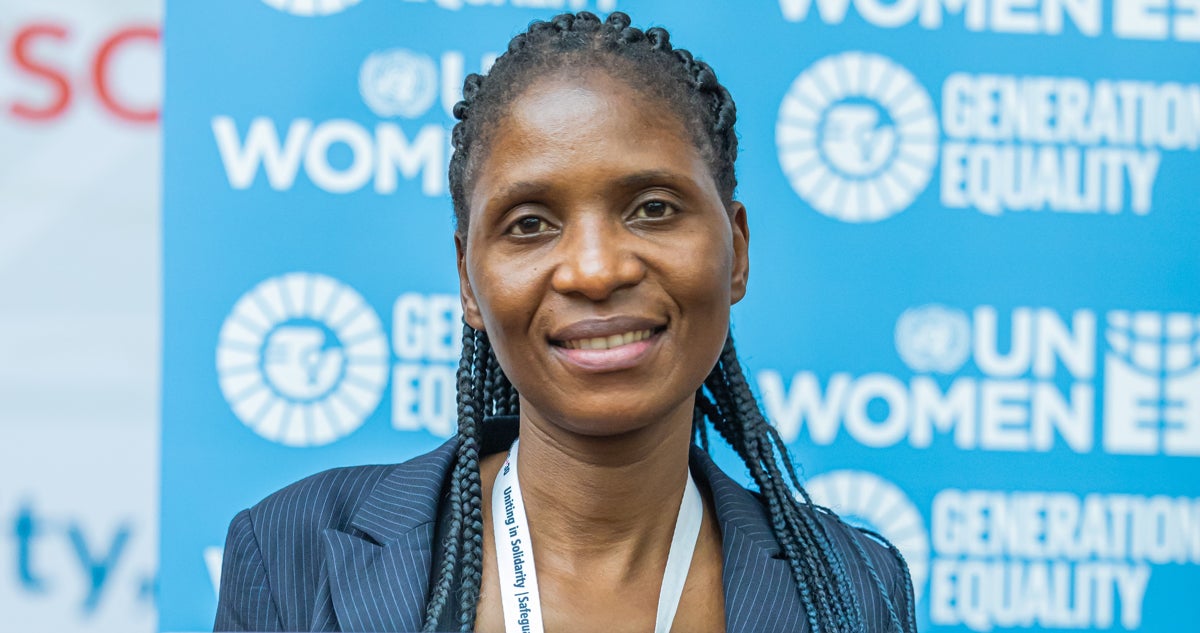I am Generation Equality: Thina Maphosa
Date:

I am Generation Equality because…
I believe in the power of inclusion, shared vision, and long-term commitment to change. My name is Thina Maphosa from Yes Trust Zimbabwe. Yes Trust is a youth-focused organization working to promote social change around issues of gender equality, sexual reproductive health and rights, youth participation in governance, and safe migration. We are Committed Makers under the Generation Equality Action Coalition on gender-based violence (GBV) alongside with other 17 organizations working under this coalition. Being deeply committed to social justice, I feel very close to my engagement with Generation Equality.
How do you see Generation Equality making a difference in your country?
Generation Equality gives women and girls affected by inequalities from different communities in Zimbabwe, the opportunity to be heard.
We have been experiencing the limitations that come with silo approaches in Zimbabwe. Generation Equality has brought more inclusivity by promoting collaboration at all levels, from the grassroots to global platforms, insisting that all voices, especially those representing vulnerable groups, are heard. It’s this inclusive approach that makes Generation Equality unique.
Issues of climate change, economic injustice, limited access to sexual and Reproductive Health and Rights (SRHR), and the alarming rise of GBV, have deeply affected Zimbabwe social structures at a local level. With Generation Equality, all stakeholders from community leaders, traditional authorities, faith-based organizations, the private sector, and civil society - can finally come together to tackle these issues. That is how we build solutions that are sustainable and relevant to the real challenges people face in our communities.
How is your organization making a difference under the Equality Agreement?
At Yes Trust Zimbabwe, our commitment to Generation Equality is grounded in our daily work. We’re committed to engaging in dialogue and promoting intergenerational communication at the community level. Young women and adolescents in Zimbabwe have limited participation in governance processes, which affects their access to essential services such as education, healthcare, and SRHR services. Social norms and patriarchy have prevented young women of participating in decision-making affecting GBV.
Under our Generation Equality Commitment, we are working to challenge and change these social norms. We are supporting local leaders, traditional authorities, and faith-based organizations to hold non-confrontational dialogues that bring up issues of child marriage, female genital mutilation, and other forms of GBV. This will help us create an enabling environment where every woman, irrespective of age or background, is empowered to make decisions about her life and well-being.
Our work also addresses the barriers young women face every day: long distances to essential services, including healthcare, education, and water access. In rural Zimbabwe, these barriers, all too often, limit opportunities for young women , increasing gender inequality. We work with local governments to ensure that these essential services are not only accessible, but also respond to the specific needs of young women, especially those pregnant, lactating, or living with disabilities.
How are you benefiting from #GenerationEquality?
Being part of the Generation Equality movement has given our organization higher visibility in global forums, more credibility and better funding opportunities. Generation Equality also gave us a feeling of togetherness. When we are faced with challenges, having someone who stands up for us is key to creating resilience. That is what Generation Equality represents for us - a network of men and women, ready to stand up by gender equality.
What specific goal do you hope to achieve in this Beijing review?
Reflecting on the journey since the Beijing Declaration in 1995, I feel proud and hopeful. Although the journey has been challenging, we made great improvements. My next step is to ensure that we have a long-term vision for the next 100 years, that sustains the progress made today. We need frameworks of accountability that hold governments and stakeholders accountable for their commitments, especially within the context of the 12 critical areas of the Beijing Platform for Action. Although much has been done, the world quickly changes with new technology, climate change, and shifting political landscapes that might create new challenges.
What are the key takeaways from this process?
The multi-stakeholder approach of Generation Equality gives us a unique opportunity to deal with challenges because it brings stakeholders such as governments, private sector, civil society, and grassroots organizations into one platform that works together to achieve common goals. We can create stronger, more inclusive policies that protect women and girls by leveraging the skills and resources of each other’s. In Zimbabwe, working together and sharing resources has proven to be effective. By learning from each other, communities can create solutions that truly address local needs.
Quote: “Being part of the Generation Equality movement has given our organization higher visibility in global forums, more credibility and better funding opportunities. Generation Equality also gave us a feeling of togetherness” - Thina Maphosa.